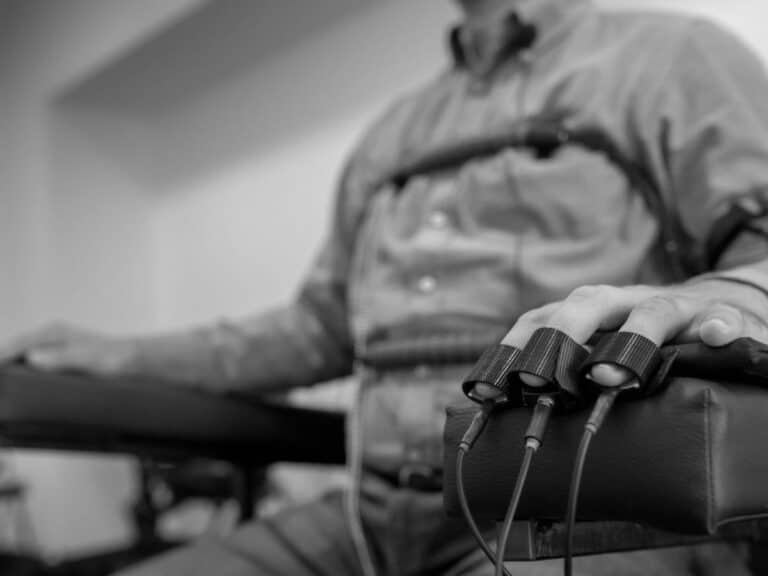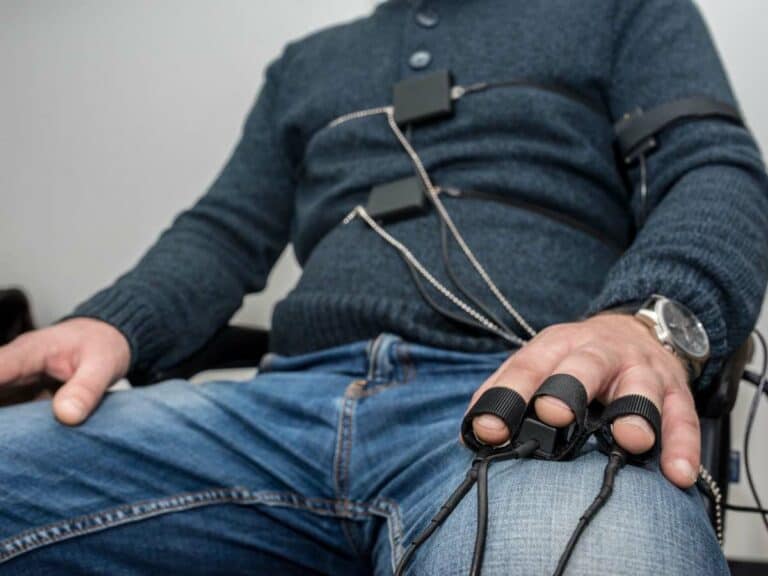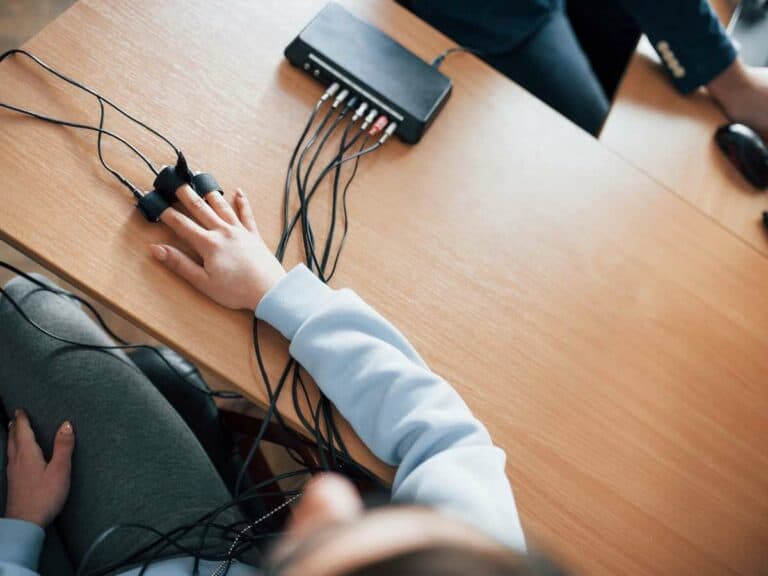20 Prescription Drugs That Affect a Lie Detector Test
A lie detector machine comes with all kinds of sensors integrated into it. As a matter of fact, the instrument can have anywhere between 4 and 6 sensors, depending on the model preferred by the polygraph examiner or what’s necessitated by the polygraph examination.
What the polygraph machine monitors and records are various physiologic processes such as blood pressure, heart rate and respiratory activity, all of which tend to increase in the event of a deception.
That’s exactly how an examiner can determine whether the examinee is lying or not.
The intake of certain prescription medications, however, can make the task of the individual administering the lie detector test complicated. That’s because most of them can alter an assortment of bodily processes, many of which are what a polygraph machine reads. Some of these drugs directly alter them, while others affect them only as a side effect.
Either way, they can keep a lie detector test from yielding a diagnosis that’s 100% accurate.
In this post, we will talk about some of the most common prescription drugs that can affect a polygraph examination. If you are taking any of them, inform the polygrapher before the question and answer portion of the exam arrives so that he or she can take the necessary action, such as rescheduling the test or declaring you unsuitable to undergo it.

1. ACE Inhibitors
Short for angiotensin-converting enzyme inhibitors, ACE inhibitors are some of the most commonly prescribed drugs by cardiologists for individuals with high blood pressure or hypertension. Belonging to a class of medications, there are various popular ACE inhibitors, including the following:
| GENERIC NAME | BRAND NAME |
| Benazepril | Lotensin |
| Enalapril | Vasotec |
| Lisinopril | Zestril |
Making ACE inhibitors work is that they help relax the blood vessels, both arteries and veins.
By widening or dilating the blood vessels, high blood pressure can be kept in check. The relaxation of the blood vessels reduces the oxygen demand from the heart, too, which is why ACE inhibitors are also commonly prescribed for heart failure, which means that the heart is no longer capable of pumping blood around the body properly.
Also sometimes referred to as congestive heart failure, heart failure affects around 6.2 million adults in the US, according to a report by the Centers for Disease Control and Prevention (CDC).
Since ACE inhibitors are designed to lower the blood pressure, they can have an effect on a lie detector test.
Unlike most other medications for hypertension, however, ACE inhibitors cause minor changes in the heart rate. So, in other words, there is a possibility for a truthful person who is on ACE inhibitors to appear deceptive while having a polygraph examination based on the blood pressure solely.
Read Also: Can a Heart Condition Affect a Polygraph?
2. Calcium Channel Blockers
No, calcium channel blockers are not drugs intended for osteoporosis, which is a disease characterized by the weakening of the bones and the major cause of fractures in both postmenopausal women and older males.
Treatment for hypertension — this is what calcium channel blockers are meant for.
You see, calcium is an important role player in the electrical activity and pumping action of the heart. While it’s helpful, calcium can do more harm than good in some instances, such as in the presence of hypertension. Calcium channel blockers are designed to limit how the heart utilizes calcium.
Thanks to the action of calcium channel blockers, the blood pressure can be lowered. In addition, they can relax the blood vessels and regulate the heart rate, too.
But because your heart and the rest of your cardiovascular system employ calcium in order for them to carry out their various functions, calcium channel blockers are also commonly prescribed by doctors to individuals who are suffering from the following issues related to the ticker:
- Angina
- Arrhythmias
- Coronary artery spasm
- Enlarged heart
- Pulmonary hypertension
Some calcium channel blockers can lower the blood pressure as well as the heart rate.
Needless to say, their intake before a lie detector examination can affect the result. Deceitful individuals who are on these medications, for instance, are likely to get a false negative.
3. Beta Blockers
Also known as beta-adrenergic blocking agents, beta blockers are a class of medicine prescribed by doctors for a number of problems involving the heart and the cardiovascular system. There are instances in which they are also recommended for treating certain conditions that have something to do with the brain and nervous system.
Beta blockers are some of the most common prescription drugs for lowering the heart rate and blood pressure. As a matter of fact, they can help fend off recurring heart attacks.
As the name suggests, beta blockers are designed to block something.
Epinephrine — it’s exactly what beta blockers block. A type of hormone, epinephrine may not ring a bell in many ears. But you will surely have a much better idea of it once you learn its other name: adrenaline.
While undergoing a lie detector test, telling a lie puts your body under stress, which causes it to release the hormone adrenaline. The presence of adrenaline in the bloodstream causes some of the physiologic processes within you to spike. They include your blood pressure, heart rate and respiratory activity.
Adrenaline can also make you sweat more, which is something a polygraph machine can pick up.
Because of the various effects they have on the body, beta blockers can have an impact on the result of a polygraph exam. Their intake can keep an examiner from coming up with a conclusive report.
As mentioned earlier, beta blockers are also sometimes prescribed for problems related to the brain and the rest of the nervous system. It’s due to this why some doctors recommend them to people who suffer from migraine and anxiety. And speaking of which, we will talk about antianxiety medications in a few — don’t stop reading now!
Read Also: Can Anxiety Disorder Cause False Positives on a Polygraph?
4. Diuretics
Many of those who are into the intake of all kinds of weight loss supplements may be familiar with diuretics. Also sometimes referred to as water pills, they help flush excess fluid in the body.
Other than individuals who like to shrink their waistlines, diuretics are also commonly taken by those who suffer from high blood pressure. Mild cases of hypertension can be managed by diuretics alone. In severe cases, however, it’s not uncommon for diuretics to be prescribed by cardiologists in combination with other drugs.
Some examples of diuretics for high blood pressure management are the following:
| GENERIC NAME | BRAND NAME |
| Bumetanide | Bumex |
| Furosemide | Lasix |
| Hydrochlorothiazide | Esidrix |
| Metolazone | Zaroxolyn |
| Spironolactone | Aldactone |
| Torsemide | Demadex |
Diuretics work against hypertension by lowering the blood volume. The majority of them provide results by helping the kidneys get rid of more sodium in the body through the urine. The elimination of sodium also eliminates water in the blood, which causes the blood volume and thus the blood pressure to drop.
It’s due to this why it’s a complete no-no for people with hypertension to have a sodium-rich diet.
Since diuretics can cause a drop in the blood pressure level, it can affect a polygraph exam — it’s very much likely for the result to be either inconclusive or a false negative.
Because certain minerals are flushed out of the body together with water, some of the common side effects of diuretics are headaches, dizziness and muscle cramps. The presence of these side effects may leave you feeling uncomfortable during your lie detector test, which may be easily mistaken by the examiner for signs of deception.
5. Benzodiazepines
Referred to at times as benzos, benzodiazepines are psychoactive drugs. This means that, in layman’s terms, they are substances that affect an individual’s mental perception such as consciousness, mood and emotion. Some other examples of psychoactive substances include alcohol and nicotine.
Commonly, benzodiazepines are used to treat anxiety and panic attacks. In some instances, they are commonly prescribed in order to deal with things such as severe stress and insomnia.
Some benzos that you may have already probably heard of include:
| GENERIC NAME | BRAND NAME |
| Alprazolam | Xanax |
| Clonazepam | Klonopin |
| Diazepam | Valium |
| Lorazepam | Ativan |
The fact that benzodiazepines are also known as tranquilizers or sedatives makes it clear why these drugs can have an effect on the result of a polygraph machine.
Popping a benzo in your mouth just before you are strapped to a lie detector machine — benzodiazepines are fast-acting drugs known to take full effect in as short as 30 minutes only — is very much likely to cause an inconclusive result or false negative because your various physiologic functions will be depressed.
By making you feel calm and relaxed, chances are that your blood pressure and heart rate will not rise that much even when asked questions that can leave you stressed or drive you to lie during a polygraph test.
However, during the pre-test phase, a trained and experienced examiner will probably detect that you have taken a benzodiazepine or something similar to it before showing up at the testing center. This will prompt him or her to cancel the examination and schedule you for a later date.
6. SSRIs and SNRIs
Benzodiazepines — as discussed earlier, these are commonly prescribed medications for anxiety and panic attacks. It was mentioned, too, that they take effect quickly, thus allowing anyone who takes them to attain relief in no time.
But then there are also other drugs for anxiety and panic attacks that can take a while to provide therapeutic benefits as they need some time for them to build up in the system.
They are, by the way, primarily intended for treating depression.
A couple of the most prescribed antidepressants are selective serotonin reuptake inhibitors (SSRIs) and serotonin-norepinephrine reuptake inhibitors (SNRIs). Not only do they sound practically the same but they also work practically the same, although with a minor difference.
SSRIs work by increasing the available amount of serotonin in the brain. Simply put, serotonin is a chemical messenger that possesses mood-regulating properties.
It’s also a key role player in the following bodily functions:
- Hunger
- Sexual desire
- Sleep
- Temperature
By the way, serotonin is also sometimes referred to as the feel-good hormone because it does exactly that — it makes you feel good. Are you one of those who feel happy and nice when eating dark chocolates? Well, the reason for it is that dark chocolates can help increase the levels of serotonin in the brain.
On the other hand, SNRIs work by increasing the amount of available serotonin and norepinephrine.
Also called noradrenaline or noradrenalin, norepinephrine is similar to serotonin in that it’s also a chemical messenger in the brain. However, it helps improve the mood by increasing focus, alertness and memory, too.
Just like most other prescription drugs, whether for mental illnesses or others, both SSRIs and SNRIs are known to cause side effects, some of which can contaminate lie detector test results.
Antidepressants are known to increase the blood pressure. And since the blood pressure is one of the things that a polygraph machine measures and records, there is a possibility for the result to be affected. This is especially true if the examiner is not aware of the examinee’s intake of SSRIs or SNRIs.
It’s also not uncommon for some of those who are taking antidepressants to be agitated and anxious, which can cause various physiologic readings to be elevated.
7. Insomnia Medications
Many OTC drugs taken by people who can’t sleep are not really treatments for insomnia, although they can indeed promote sleep. Some very popular examples are antihistamines, which are a class of drugs used to deal with the symptoms of allergies. And drowsiness is a common side effect of antihistamines.
As soon as the polygraph examiner notices that the examinee seems drowsy, he or she will cancel the test.
Earlier, we mentioned the fact that benzodiazepines are commonly prescribed not only for anxiety and panic attacks but also for insomnia.
But the problem with using benzodiazepines for managing insomnia is that these fast-acting drugs are known to cause nasty withdrawal symptoms. So, in other words, when the person who suffers from insomnia stops taking them at bedtime after a while, he or she may experience dizziness, blurred vision, concentration problems, tinnitus, anxiety and even nightmares.
It’s a good thing that there are a few other drugs for insomnia besides benzodiazepines, and each one of them can affect the results of a lie detector test.
Let’s take a look at some of those that doctors usually prescribe to insomniacs:
| GENERIC NAME | BRAND NAME |
| Doxepin | Silenor |
| Eszopiclone | Lunesta |
| Lemborexant | Dayvigo |
| Ramelteon | Rozerem |
| Suvorexant | Belsomra |
| Zolpidem | Ambien |
Different prescription drugs for insomnia work differently. Some work by depressing the central nervous system (CNS), while others deliver results by blocking histamine receptors, which can cause drowsiness. Others are designed to target the sleep-wake cycle itself.
No matter the case, one thing remains true: these drugs can affect a polygraph exam.
8. Cough and Cold Medicines
Some cough and cold medicines are available only with a doctor’s prescription. That’s because they can be very addictive — making them available OTC can make some people abuse them without any trouble.
The majority of prescription drugs for cough and cold can be quite sedating.
Needless to say, taking them on the day of your lie detector test can lead to an inconclusive result or a false negative since you will feel too sleepy to feel guilty, in case you have any reason to feel guilty. As a matter of fact, it’s not uncommon for some individuals who are planning on beating a polygraph exam to take sleeping pills beforehand.
But it’s certain that a good polygraph examiner will be able to tell that you have taken something with a drowsy effect by the way you talk and move during the test.
Other than sedation, cough and cold medicines can also increase the blood pressure as a result of the constriction of the blood vessels. As a result of this, the heart rate follows suit — your heart beats faster than normal. All of these unusual physiologic processes will be noticed by the polygraph examiner during the pre-test phase.
Just Before You Take a Drug on the Day of Your Polygraph Test
A polygraph exam can sometimes yield an inconclusive result, which means that the examiner is unable to determine whether the individual is being truthful or being deceitful. In some instances, the test can also lead to either a false positive or a false negative, both of which are considered errors in the world of polygraphy.
There are many things that can cause an inconclusive result or an error, and some of them are prescription medications taken by the examinee before the test.
In many instances, a prescription drug has to be taken on a daily basis. Some of them include those that are intended for managing high blood pressure or arrhythmias and putting anxiety disorder or panic attacks under control. Due to this, discontinuing them because you have a scheduled lie detector test is not a good idea.
Make sure that you inform the polygraph examiner about any prescription drugs you are taking so that the necessary actions may be taken.
For instance, if you are taking medications for a serious medical condition, the examiner may ask you to secure a medical clearance from your doctor beforehand. Or you may be completely prohibited from undergoing the test if the drugs you are taking can keep a conclusive result at bay or your life can be put at risk because of your health issue.
Read Next: How Does a Polygraph Work






